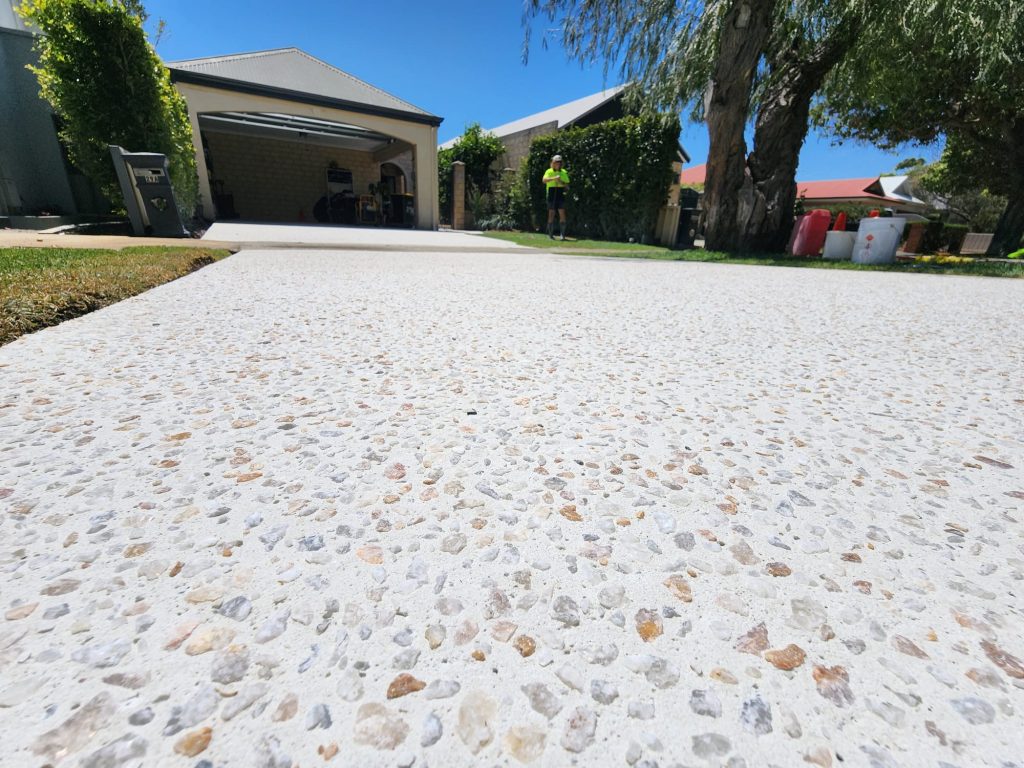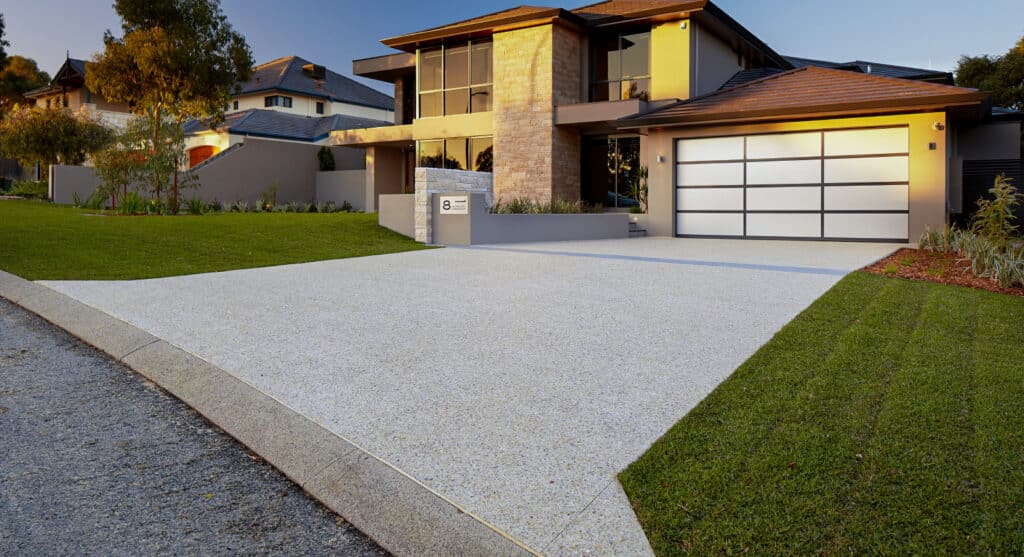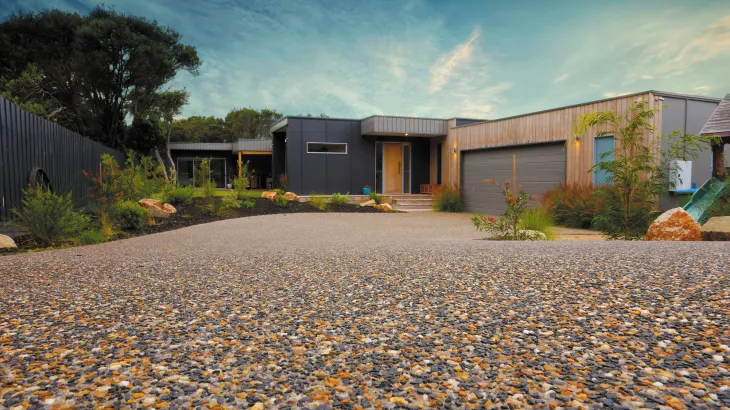
Maintaining your concrete driveway is essential to ensure its longevity and aesthetic appeal. As an experienced concrete contractor in Geelong, I understand the importance of regular concrete driveway sealing to protect your investment.
In this guide, I’ll explain why sealing your concrete driveway is crucial, how often you should do it, and the best practices for ensuring a long-lasting, durable surface.
Table of Contents
- Why Sealing Your Concrete Driveway is Essential
- How Often Should You Seal Your Concrete Driveway?
- Signs That Your Driveway Needs Resealing
- Best Practices for Sealing Your Concrete Driveway
- Regular Maintenance Tips for a Sealed Concrete Driveway

Why Concrete Driveway Sealing is Essential
Concrete driveway sealing is vital for protecting the surface from various elements. Unsealed concrete is vulnerable to moisture, chemicals, and wear and tear from vehicles. These factors can lead to cracks, spalling, and other damage over time.
A good sealer acts as a barrier, preventing water and harmful substances from penetrating the concrete, thus extending its lifespan and maintaining its appearance.
How Often Should You Seal Your Concrete Driveway?
The frequency of sealing your concrete driveway depends on several factors, including the local climate, the amount of traffic it endures, and the type of sealer used. Generally, it’s recommended to reseal your driveway every two to five years. However, in areas with harsh weather conditions or heavy use, more frequent resealing might be necessary.
Signs That Your Driveway Needs Resealing
- Water Absorption:
If water no longer beads on the surface and is quickly absorbed, it’s time to reseal. - Fading Colour:
A noticeable dullness or colour fading indicates the sealer is wearing off. - Stains and Discoloration:
Oil, dirt, and other stains becoming more prevalent suggest the protective layer is compromised. - Cracks and Surface Damage:
Visible cracks and surface roughness are signs of wear that need addressing. - Loss of Gloss:
If your driveway has lost its shiny finish, it’s a clear indication that resealing is due.
Best Practices for Sealing Your Concrete Driveway
- Choose the Right Sealer:
Use a high quality, penetrating sealer suited for your specific climate and driveway use. - Prepare the Surface:
Clean the driveway thoroughly, removing all dirt, oil, and debris. Repair any cracks or damage before sealing. - Optimal Weather Conditions:
Apply the sealer during mild, dry weather to ensure proper curing. Avoid sealing in extreme temperatures or when rain is forecasted. - Application Techniques:
Use a sprayer or roller to apply the sealer evenly. Follow the manufacturer’s instructions for the best results. - Curing Time:
Allow adequate time for the sealer to cure completely before using the driveway. This usually takes 24 to 48 hours, depending on the product.
- Choose the Right Sealer:
Regular Maintenance Tips for a Sealed Concrete Driveway
- Regular Cleaning:
Sweep the driveway regularly to remove dirt and debris. Use a mild detergent and water for deeper cleaning. - Avoid Harsh Chemicals:
Stay away from de-icing salts and harsh chemicals that can damage the sealer. - Immediate Stain Removal:
Clean up oil and other spills promptly to prevent staining. - Inspect Regularly:
Periodically check for signs of wear or damage and address them promptly to maintain the integrity of the seal.

Why Choose Us for Your Concrete Driveway Sealing?
- Expertise: With years of experience in residential and commercial concreting, we provide top quality sealing services.
- Quality Products: We use only the best sealers, ensuring long-lasting protection for your driveway.
- Professional Service: Our team is dedicated to delivering exceptional results and customer satisfaction.
- Comprehensive Care: We offer thorough surface preparation and meticulous application for the best finish.
- Local Knowledge: Understanding the specific needs of Geelong’s climate, we tailor our services to ensure optimal performance.
- Expertise: With years of experience in residential and commercial concreting, we provide top quality sealing services.
FAQs
The best sealer for a concrete driveway depends on factors such as climate, driveway usage, and desired finish. A penetrating sealer, like a silane-siloxane or siliconate sealer, is excellent for long-term protection as it absorbs into the concrete and repels water, oil, and de-icing salts without changing the appearance. If you want a glossy or wet-look finish, an acrylic-based sealer is a great choice, as it enhances the colour of the concrete while providing protection. Epoxy and polyurethane sealers offer stronger protection but can be more expensive and slippery when wet. Choosing a high-quality, UV-resistant sealer will ensure better durability, especially in areas with harsh sun exposure or frequent rain.
The time required to seal a concrete driveway depends on the preparation, weather conditions, and type of sealer used. The application itself usually takes a few hours to a full day, but the drying or curing time is crucial. Most sealers require at least 24 hours before foot traffic and 48 to 72 hours before vehicle use to allow proper bonding. If the weather is humid or cold, curing may take longer. It’s important to check the manufacturer’s guidelines and avoid sealing on rainy or extremely hot days, as improper curing can reduce the sealer’s effectiveness.
Yes, sealing a concrete driveway is a manageable DIY project if you follow the right steps and use the correct materials. The process involves cleaning, repairing cracks, and applying the sealer evenly with a roller, sprayer, or brush. However, professional sealing is recommended for larger driveways, stamped concrete, or areas with significant damage, as experts use specialised equipment for a smoother, longer-lasting finish. If you choose to do it yourself, ensure you select the right type of sealer, apply it on a dry day, and follow all instructions carefully to avoid uneven coverage or peeling.
Proper preparation is key to ensuring the sealer adheres correctly and lasts longer. Start by removing all dirt, debris, oil stains, and mould using a pressure washer or a concrete cleaner. If there are cracks, they should be filled with a concrete crack filler and left to cure before sealing. Any old, peeling sealer should be stripped away to prevent layering issues. Once cleaned and repaired, the driveway should be completely dry, as sealing over moisture can cause bubbling or peeling. Avoid sealing if rain is expected within 24 to 48 hours to allow for proper curing.
Sealing your concrete driveway provides long-term protection and enhances its appearance. It prevents water absorption, reducing the risk of cracks and damage caused by freezing and thawing cycles. A good sealer also repels oil, grease, and stains, making the driveway easier to clean. If you have decorative or coloured concrete, a sealer helps preserve its colour and prevent fading from UV exposure. Additionally, sealing extends the lifespan of the concrete, reducing the need for costly repairs or resurfacing over time.
Maintaining a sealed concrete driveway is relatively simple but requires regular care to keep it looking good and functioning well. Sweeping and occasional hosing down will help remove dirt, leaves, and debris that can cause wear over time. For tougher stains, use a mild detergent and a soft brush, avoiding harsh chemicals or acidic cleaners that can break down the sealer. Avoid dragging heavy objects that could scratch the surface, and reapply the sealer every 2 to 5 years depending on wear and exposure. If water stops beading on the surface, it’s a sign that resealing may be necessary.
Concrete driveways can crack due to a variety of reasons, including temperature changes, moisture infiltration, heavy loads, and poor installation. As concrete expands and contracts with fluctuating temperatures, small cracks can develop over time, particularly if the driveway wasn’t reinforced properly. Water seepage can also weaken the concrete, especially if it freezes and expands in cold weather. Additionally, tree roots growing underneath, soil shifting, or excessive vehicle weight can put stress on the concrete, leading to larger cracks. While small hairline cracks are normal, sealing your driveway and addressing drainage issues can help minimise future cracking and prolong its lifespan.

